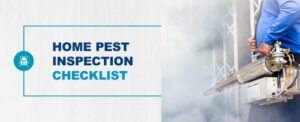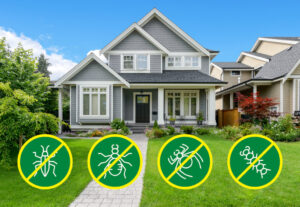Introduction:
Pests can be a major problem for homeowners and businesses alike. They can cause damage to property, spread diseases, and create unsanitary conditions. Prevention is key when it comes to keeping pests out of your home or business. In this article, we will explore some effective strategies for preventing future pest problems.
Identify and Seal Entry Points: Pests can enter your home or business through small cracks, gaps, and holes. It is essential to identify and seal all entry points to prevent pests from getting inside. Some common entry points include gaps around windows and doors, cracks in the foundation, and gaps around utility lines. By sealing these entry points, you can prevent pests from entering your property.

Maintain Cleanliness:
Pests are attracted to food, water, and shelter. By keeping your property clean and tidy, you can make it less appealing to pests. This means cleaning up spills and crumbs immediately, storing food in airtight containers, and regularly taking out the trash. In addition, you should declutter your property to eliminate hiding places for pests.
Regular Inspections:
Regular inspections are crucial for detecting and preventing pest problems. Hire a professional pest control company to conduct regular inspections of your property. They can identify any signs of pest activity and take appropriate measures to prevent infestations.

Proper Storage:
Proper storage of food, clothing, and other items is important for preventing pest problems. Food should be stored in airtight containers to prevent pests from accessing it. Clothing should be stored in plastic containers or bags to prevent damage from pests such as moths. Additionally, items stored in basements, attics, and other storage areas should be elevated off the ground to prevent pests from accessing them.
Landscaping:
Landscaping can play a significant role in preventing pest problems. Pests such as rodents and insects are attracted to overgrown vegetation and standing water. Keep your lawn and landscaping well-maintained to reduce the risk of pest problems. Trim back overgrown bushes and trees, remove standing water, and eliminate any debris or clutter from your yard.

Staying Vigilant:
Preventing pest problems is an ongoing process that requires vigilance and attention to detail. Even with the best preventative measures in place, pests can still find their way into your property. That’s why it’s important to stay vigilant and be on the lookout for signs of pest activity.
Implementing a Pest Control Plan:
In addition to the strategies discussed above, it’s important to have a pest control plan in place. A pest control plan outlines the steps that will be taken to prevent and control pest problems. This plan should be tailored to your specific property and should take into account the types of pests that are common in your area.
Some common signs of pest activity include droppings, damage to property, unusual odors, and the presence of pests themselves. If you notice any of these signs, it’s important to take action immediately. Contact a professional pest control company to conduct an inspection and recommend appropriate treatment options.
It’s important to educate yourself on the types of pests that are common in your area and how to prevent them. For example, if you live in an area with a high risk of termite infestations, you may need to take extra precautions to prevent these pests from entering your property.
A pest control plan typically involves a combination of preventative measures and treatment options. Preventative measures, such as sealing entry points and maintaining cleanliness, can help to reduce the risk of pest problems. Treatment options may include the use of pesticides, traps, and other methods to eliminate pests that have already entered your property.
Benefits of Preventing Pest Problems:
Preventing pest problems is not only important for the health and safety of your property, but it also has many other benefits. For example, by preventing pest problems, you can:
- Save Money: Pest infestations can be costly to treat and can cause damage to your property. By preventing infestations, you can save money on costly repairs and treatments.
- Maintain Property Value: Pest problems can lower the value of your property and make it more difficult to sell. By preventing pest problems, you can maintain the value of your property and ensure that it remains attractive to potential buyers.
- Protect Your Health: Pests can carry diseases and allergens that can be harmful to your health. By preventing infestations, you can protect yourself and your family from these health risks.
- Improve Quality of Life: Pest infestations can be stressful and can impact your quality of life. By preventing infestations, you can enjoy a pest-free home or business and avoid the stress and inconvenience of dealing with pest problems.
It’s important to work with a professional pest control company to develop and implement a pest control plan. They can help to identify potential problem areas, recommend effective treatment options, and provide ongoing monitoring to ensure that your property remains pest-free.
Integrated Pest Management: Integrated Pest Management (IPM) is a holistic approach to pest control that focuses on preventing pest problems before they occur. IPM involves a combination of preventative measures, such as sealing entry points and maintaining cleanliness, as well as treatment options, such as the use of pesticides and traps.

One of the key principles of IPM is to use the least toxic methods of pest control first. This may involve using physical methods, such as traps and exclusion methods, before resorting to chemical pesticides. IPM also involves monitoring for pest activity and taking action at the first sign of a problem.
By implementing an IPM approach to pest control, you can reduce the risk of pest problems and minimize the impact of any pests that do enter your property. This approach is also more environmentally friendly than traditional pest control methods, as it uses less pesticides and focuses on prevention rather than treatment.
Pest problems can be a nuisance and can cause damage to your property. However, by implementing these effective strategies for preventing future pest problems, you can keep your property pest-free. Remember to identify and seal entry points, maintain cleanliness, conduct regular inspections, store items properly, and maintain your landscaping. With these strategies in place, you can enjoy a pest-free home or business.
Remember, prevention is always better than treatment when it comes to pest control. By taking proactive steps to prevent pest problems, you can save yourself time, money, and stress in the long run. If you’re struggling with pest problems, don’t hesitate to contact a professional pest control company for help. They have the knowledge, expertise, and tools to effectively eliminate pests and prevent future infestations.
Conclusion
Preventing future pest problems requires a comprehensive approach that includes identifying and sealing entry points, maintaining cleanliness, conducting regular inspections, storing items properly, maintaining your landscaping, developing a pest control plan, and using an integrated pest management approach. By implementing these strategies and staying vigilant, you can keep your property pest-free and avoid the headaches and costs associated with pest infestations.


















